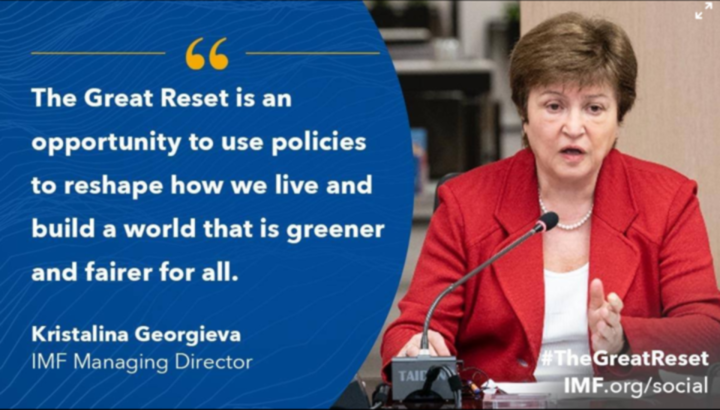The "Great Reset" is dismissed by the public as a conspiracy
theory. But it is not. It is a global agenda driven by the World Economic
Forum. Cüneyt Yilmaz, 7/5/2021 German original
Cüneyt Yilmaz, 7/5/2021 German original
Accusations are emerging in various media that the "Great Reset" initiative is a conspiracy narrative that contradicts reality. But on June 3, 2020, the World Economic Forum (WEF) had issued a press release titled "The Great Reset: A Unique Twin Summit at the Start of 2021."
The World Economic Forum's release can be read here
Klaus Schwab, the World Economic Forum and the IMF
WEF founder Klaus Schwab and Thierry Malleret, who serves as senior director of the WEF's Global Risk Network, have published a book titled "Covid-19: The Great Reset" about six months after the start of the 2020 Corona pandemic. The release date of the book is July 9, 2020.
In their book, they write, among other things:
"Because of the high degree of interdependence and interconnectedness of today's economies, industries, and businesses, comparable to the dynamics with which macro categories are interconnected, each link in the chain can quickly trigger a domino effect on the others in a wide variety of ways. Let's look at restaurants as an example. This industry was hit by the pandemic on such a dramatic scale that it is not even certain how the restaurant industry will ever fully recover. One restaurant operator put it this way: 'Like hundreds of other chefs in the city and thousands across the country, I now face the big question of what our restaurants, our careers, our lives might look like if we ever get them back at all.' In France and the United Kingdom, several industry experts estimate that up to 75 percent of independent restaurants may not survive the lockdowns and subsequent social distancing. Surviving, on the other hand, will be the large chains and fast-food giants. This suggests that large companies will get bigger while the smallest shrink or disappear altogether."
"Micro-upheaval will force every company in every industry to try new ways of doing business and operating. Those who give in to the temptation to return to the old way of working will fail. All those, on the other hand, who adapt with flexibility and imagination will eventually use the Covid 19 crisis to their advantage."
"The reduction in soc. contacts in response to Corona and the physical standoff measures imposed during the curfew will also help e-commerce emerge as an increasingly strong industry trend. Consumers need products, and if they can't shop, they will inevitably move to buying them online. And then it becomes a habit. People who have never shopped online before will become friends with it, while casual online shoppers will now move to it more and more. That became clear during the lockdown."
"As Henry Kissinger noted: 'The cohesion and economic success of countries is based on the belief that their institutions can anticipate disasters, stop their effects, and restore stability.' When the Covid 19 pandemic is over, the institutions of many countries will be branded as failures.' This is especially true for some rich countries with state-of-the-art health systems and sophisticated research, science, and innovation, whose citizens will wonder why their country's public sector performed so poorly compared to others. In these countries, the very fabric of their social fabric and socioeconomic system may come out and be denounced as the 'real' culprit that has failed to provide economic and social well-being for the majority of citizens."
IMF chief Kristalina Georgieva, at the end of a memo on the "Great Reset," states, "Let me conclude with an example from the past. William Beveridge, in the midst of World War II, submitted his famous report in 1942 projecting how Britain should address what he called the 'five giant evils.' That famous 'Beveridge Report' led to a better country after the war - including the creation of the National Health Service, which saves so many lives in Britain today. It was also at this time that my institution, the IMF, was founded - at the Bretton Woods Conference. So now is the time to turn the page - and use all the power we have. In the case of the IMF, we have a financial capacity of a trillion dollars and a huge political commitment. This is the moment to decide that history will look back on this as a 'Great Reset' and not a 'Great Reversal.' And I want to say - loud and clear - that the best memorial we can build for those who lost their lives in the pandemic is to create a world that is greener, smarter and more just."


